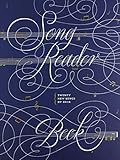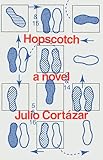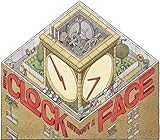1.
 Have you heard Beck’s new album? After about 20 hours with it I’ve still only heard seven songs out of 20.
Have you heard Beck’s new album? After about 20 hours with it I’ve still only heard seven songs out of 20.
That’s because I’m a mediocre musician, with poor sight-reading skills and no piano handy, and Song Reader, if you didn’t already know, is just sheet music. No CD, no link to downloadable MP3s, nada. I have to puzzle out the melodies on my guitar, drawing on long forgotten undergraduate music theory to get the rhythms right. It is a pain in the ass. The album would sound better if it were professionally recorded, by a real artist.
And yet. When I finally manage to play through “I’m Down,” and “America, Here’s My Boy,” and “Do We? We Do,” it is revelatory. I have just channeled Beck’s spirit through printed paper! The first versions of Beck’s songs I hear are my own! This is an amazing feeling.
If you are not musically trained and do not have a musician near at hand, Song Reader may be a tough sell. True, the artwork is nice to look at. You can read the lyrics, and the introduction by Jody Rosen, and the foreword by Beck himself. These are worthwhile activities. The graphic design is skillful. Beck’s lyrics read well, for song lyrics. The introductions are illuminating. And as you look all this over you will think, for the first time, probably, about how back in the day people did not buy albums, they bought scores, and you sat in a park or your parlor (whatever that is) and listened to someone’s interpretation of those scores, maybe a friend or a relative, or you interpreted them yourself.
But then you will want to hear the songs, and they are not readily accessible. In fact, a few months ago they weren’t accessible at all. When I first received the album (in the mail!), only four of the songs had been recorded and shared online, and the renditions ranged from decent (The New Yorker staff) to tragic. By the time I sat down to write this essay, though, over 100 had been uploaded to the official McSweeney’s website and YouTube. There is already one very polished video of “Old Shanghai,” the pre-released sheet music single. The Portland Cello Project has now recorded the whole thing and posted it on YouTube.
These options will still leave some people dissatisfied, and they may remain so until Beck releases “official” versions. Which he will, of course, in due time (though according to an interview not anytime soon). That’s why there’s no reason for anyone to complain.
As for me, I’m trying to steer clear of other people’s versions, at least until I’ve made my own.
2.

 I’ll leave it for accomplished music writers to review the music. I want to talk about Song Reader as a book. It is a great book. It is better than Choose Your Own Adventure books, or Julio Cortázar’s Hopscotch, or The Clock Without a Face, a 2010 McSweeney’s production whose busily illustrated pages hid clues to a real-world treasure-hunt.
I’ll leave it for accomplished music writers to review the music. I want to talk about Song Reader as a book. It is a great book. It is better than Choose Your Own Adventure books, or Julio Cortázar’s Hopscotch, or The Clock Without a Face, a 2010 McSweeney’s production whose busily illustrated pages hid clues to a real-world treasure-hunt.
Beck’s book is better than all of these because it does not feel forced or gimmicky. It is the hipster tendency to appropriate anachronism at its very, very best. Why? Because it requires hack musicians like myself to push their abilities. Because it is nostalgia in its purest form. (See the moon begin to rise / just like it did back home, I sing as I play “Old Shanghai.”) Because it trains patience. Because through anachronism it succeeds in making brilliant use of current technological forms, reproducing endlessly, an album with infinite authentic tracks. Because I will practice Beck’s songs, along with thousands of other people, and we will watch and listen along with Beck as the world plays his music. He will find out how his music sounds. I will find out, too. Neither of us will have the final say. It is ultra-quaint and ultra-post-modern simultaneously.
This is a really fantastic book.
Did I mention it sounds good? I mean, I sound good when I read the pages out loud, and that’s saying a lot. The songs are user-friendly, in easy musical keys, consciously written for people like me. Thank you, Beck!
3.
Classical musicians and jazz musicians and producers of musicals regularly encounter music in its raw and unprocessed state. What makes Song Reader nothing short of genius is the way it upends the expectations of its audience, most of whom (I assume) do not read music for a living, or even recreationally. No one gets to instantly download the songs. There are no traditional reviews. No previews on iTunes. When people discuss the relative merits of the album, the conversation cannot help but become a meta-conversation: “What is an album?” “Where is the album?” “Whose album is it?” I have had a few of these conversations. They are everything philosophizing should be — earnest, enthusiastic, and revelatory. Someone points out that no one can pirate the album. Someone else wonders about copyright law: can you just perform Beck’s songs, or does he get royalties? The conversation veers towards cover bands, and whether they have any legal or financial obligation to the original band. We think about music, and law, and authenticity through the lens of Beck’s book, as though for the first time. Song Reader is about firsts.
One of those firsts, for me, is the realization of a reward built into sheet music that cannot happen any other way. Playing Beck’s songs is like discovering home-cooking after a life of eating at restaurants. This feeling of discovery is not better than listening to Beck play his own songs, no more than preparing my own pasta is better than going out to my favorite Italian joint. Home-cooking is not better or worse than eating at restaurants. It is an entirely different activity. This is what Beck wanted: “Learning to play a song is its own category of experience.”
Some activities should not be forgotten by popular culture. Cooking is among them. So, too, is the musical experience that Beck has recreated. There is no word for it, but now I know what it is, and it is beautiful and exciting and profoundly different from any experience of music I have ever had. Like cooking, it has been eclipsed by technologies of convenience. It takes time and effort to play through Beck’s album, or to wait for other people to do so, or to call your musician friends and have them do it for you. This is time and effort many people won’t want to spend.
Too bad. It’s worth it. You won’t just hear the album, you’ll work for it. And that work will add to the music, just like you can taste your own labor in a home-cooked meal. I’m not saying every album should come out in the form of sheet music. Neither is Beck. But in its exceptionalism, Song Reader reminds us of the invisible losses that accompany cultural movement and technological innovation, losses that need not always be accepted. (There is probably a lesson in here somewhere about the relationship between paper books and e-books.) Be careful, says Beck’s experiment. Move slowly, and make sure you haven’t left anything important behind. Why did you leave it? Was there room to bring it along?
At Slate, Geeta Dayal describes Song Reader as a signpost of the new earnestness in our culture, offering tepid praise: “It’s not a bad thing — it’s a constructive impulse, and a sincere one.” But she also warns us not to “mistake it for a manifesto,” pointing out that Bing Crosby, whose song “Sweet Leilani” inspired Song Reader, couldn’t read music, and neither could Jimi Hendrix. Beck, she complains, made much use of the recording studio. So let’s not get preachy about halcyon days, right?
Maybe. But Beck (and McSweeney’s) never meant Song Reader as an anti-technology manifesto. Otherwise there wouldn’t be an official website for people to upload their songs. What makes it feel like a manifesto (a fuck you, according to Dayal) is latent insecurities in our own culture, insecurities that I share, about loss and progress. Fox-hunts do not look like manifestos because we are not sad about what their disappearance represents. At best they seem romantic, at worst a reminder of a barbaric past better forgotten entirely.
That’s not the case with Song Reader. When Song Reader is stuck in my head, I feel a strange kind of longing. My iPod can’t give me what I want. Neither can the Internet, really, since what I want is more versions of the songs that belong to ME. I want to hear more of my Beck album! But now I’ve played through all the songs I can sight-read easily. So I’m either going to have to work harder or get some help — two activities I would never have associated with listening to music, but which are now integral to one of my favorite albums in a long, long time. And I can say “favorite” confidently, without even having listened to the whole thing.








